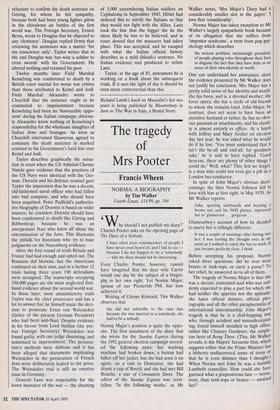The tragedy of Mrs Pooter
Francis Wheen
NORMA: A BIOGRAPHY by Tim Walker Fourth Estate, £14.99, pp. 194 Why should I not publish my diary?' Charles Pooter asks on the opening page of The Diary of a Nobody.
I have often seen reminiscences of people I have never even heard of, and I fail to see — because I do not happen to be a 'somebody' — why my diary should not be interesting.
Even Charles Pooter, however, cannot have imagined that his dear wife Carrie would one day be the subject of a biogra- phy in her own right. Yet Norma Major, spouse of our Pooterish PM, has now achieved it.
Writing of Glenys Kinnock, Tim Walker observes that she did not subscribe to the view that because she was married to a somebody, she had to be a nobody.
Norma Major's position is quite the oppo- site. The first instalment of the diary that she wrote for the Sunday Express during the 1992 general election campaign record- ed the following news: her washing machine had broken down; a button had fallen off her jacket, but she had sewn it on again; on a visit to Doncaster, she had drunk a cup of Bovril; and she had met Bill Roache, a star of Coronation Street. The editor of the Sunday Express was crest- fallen. 'In the following weeks,' as Mr
Walker notes, 'Mrs Major's Diary had a considerably smaller slot in the paper.' I love that 'considerably'.
Norma Major has taken exception to IsAr Walker's largely sympathetic book because of its allegation that she suffers from 'impostor syndrome', a term from pop psy- chology which describes
the serious problem, increasingly prevalent, of people playing roles throughout their lives to disguise the fact that they have little or no sense of their own identity or worth.
One can understand her annoyance, since the evidence presented by Mr Walker does not justify his conclusion. Mrs Major has a pretty solid sense of her identity and worth: she has been, and is, a devoted mother; she loves opera; she has a circle of old friends I to whom she remains loyal. John Major, by contrast, does not seem to have been an attentive husband or father; he has no obvi- ous passions or attachments; and his identi- ty is almost entirely ex officio. At a lunch with Jeffrey and Mary Archer on election day last year, he was asked what he would do if he lost. 'You must understand that it isn't the be-all and end-all, for goodness sake,' he is said to have replied. 'Good heavens, there are plenty of other things could do.' Well, what? This, lest we forget, is a man who could not even get a job as a London bus-conductor.
In spite of John Major's obvious short- comings, the then Norma Johnson fell in love with him at first sight, in May 1970. As Mr Walker reports:
John, sporting sideboards and wearing a brown suit and his NHS glasses, impressed her as 'glamorous ... gorgeous ...
Glamourboy's account of how he decided to marry her is tellingly different: It was a couple of mornings after having met her. I was turning the thought over in rnY mind as I walked to catch the bus to work. It just became perfectly clear, I think.
Before accepting his proposal, Norma asked three questions: did he ever wear braces or tank-tops, or carry a purse? To her relief, he answered no to all of them.
The tragedy of Norma Major is that she was a decent, contented soul who was sud- denly expected to play a part for which she had neither the appetite nor the aptitude: she hates official dinners, official pho- tographs and all the other paraphernalia of international statesmanship. John Majors tragedy is that he is a clod-hopping twit who, through accident and misunderstand- ing, found himself installed in high office, rather like Chancey Gardener, the simple- ton hero of Being There. (This, Mr Walker reveals, is the Majors' favourite film, which suggests either that the Prime Minister has a hitherto undiscovered sense of irony or that he is even dimmer than I thought.) When Norma met John he was a humble Lambeth councillor. How could she have guessed what a preposterous fate — worse, even, than tank-tops or braces — awaited her?


























































 Previous page
Previous page